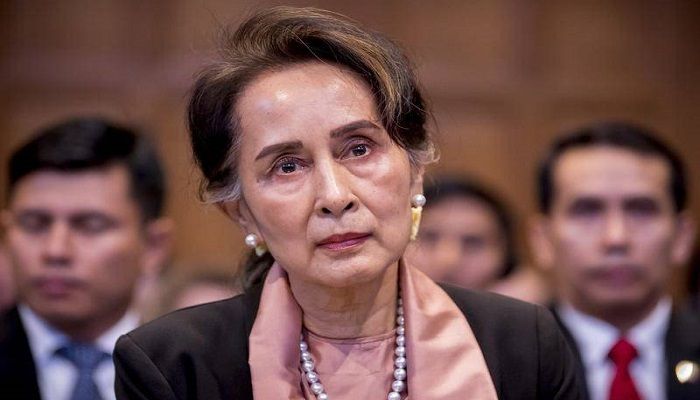
Desk Report
Publish: 11 Dec 2019, 10:55 am

Nobel peace laureate Aung San Suu Kyi will defend Myanmar against genocide accusations at the ICJ. Photo: Collected
Nobel Peace Prize winner Aung San Suu Kyi will lead Myanmar's defense at the International Court of Justice, the UN's highest court, where her country faces accusations of genocide against its Rohingya Muslim minority.
Gambia, a West African country, has launched a case against Myanmar at the World Court, alleging it has violated the 1948 Genocide Convention.
Suu Kyi, Myanmar's top political leader, shocked critics and galvanized supporters at home by travelling to The Hague to head her country's delegation.
Her office said she was going to defend the national interest.
Suu Kyi listened impassively on Tuesday as lawyers for Gambia detailed graphic testimony of suffering of Rohingyas at the hands of the Myanmar military.
She is set to speak in Myanmar’s defense today. She is expected to argue that her country was conducting legitimate operations against Rohingya militants and that the ICJ has no jurisdiction in the case.
Her decision to personally lead the southeast Asian nation’s case at the world court has proved popular at home, where the Rohingyas are widely regarded as illegal immigrants despite having lived there for decades.
In three days of hearings this week, judges have heard the first phase of the case: Gambia's request for "provisional measures" - the equivalent of a restraining order against Myanmar to protect the Rohingya population until the case is heard in full.
Although Suu Kyi has not revealed details of her government's defense, she and her legal team are expected to argue that the court lacks jurisdiction, and that no genocide has taken place in Myanmar.
Gambia has argued it is every country's duty under the 1948 Convention to prevent a genocide from taking place.
Gambia has political support from the Organisation of Islamic Cooperation, as well as several Western nations including Canada and the Netherlands.
More than 730,000 Rohingya fled Myanmar after the military launched a crackdown in the country's western Rakhine state in August 2017. Most now live in crowded refugee camps in Bangladesh.
Myanmar argues the military "clearance operations" in Rakhine were a justifiable response to acts of terrorism, and that its soldiers have acted appropriately.
The legal threshold for a finding of genocide is high, with only three cases recognized under international law since World War II: In Cambodia in the late 1970s; In Rwanda in 1994; and at Srebrenica, Bosnia, in 1995.
Although a United Nations fact-finding mission found that "the gravest crimes under international law" had been committed in Myanmar and called for genocide trials, no court has weighed evidence and established a genocide in Myanmar.
Asked about the possibility that Suu Kyi could flatly deny atrocities have taken place in Myanmar, Gambian Justice Minister Abubacarr Tambadou said outside the court on Monday it would be "extremely disappointing" if she did so again.
Subscribe Shampratik Deshkal Youtube Channel
© 2024 Shampratik Deshkal All Rights Reserved. Design & Developed By Root Soft Bangladesh